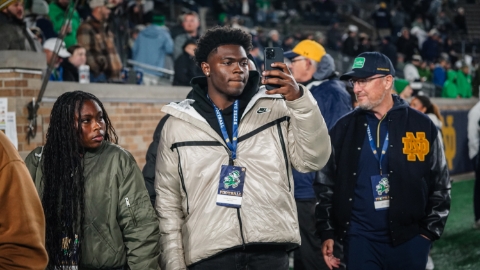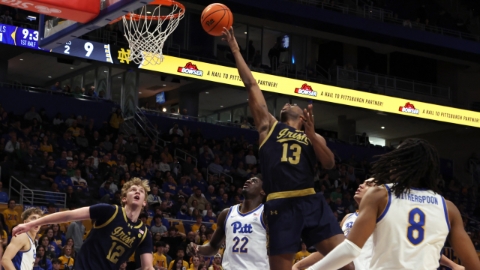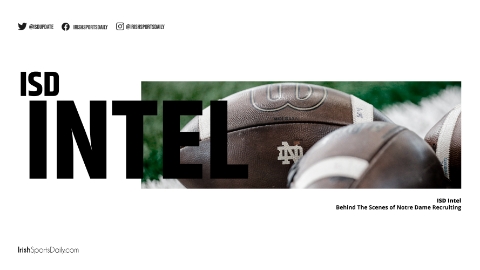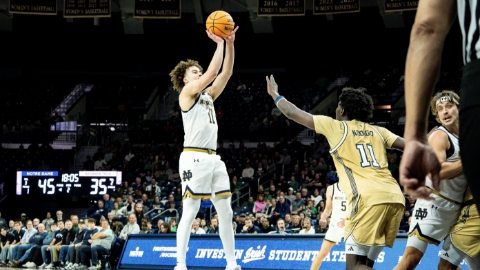College Football Playoff Media Day | Transcript
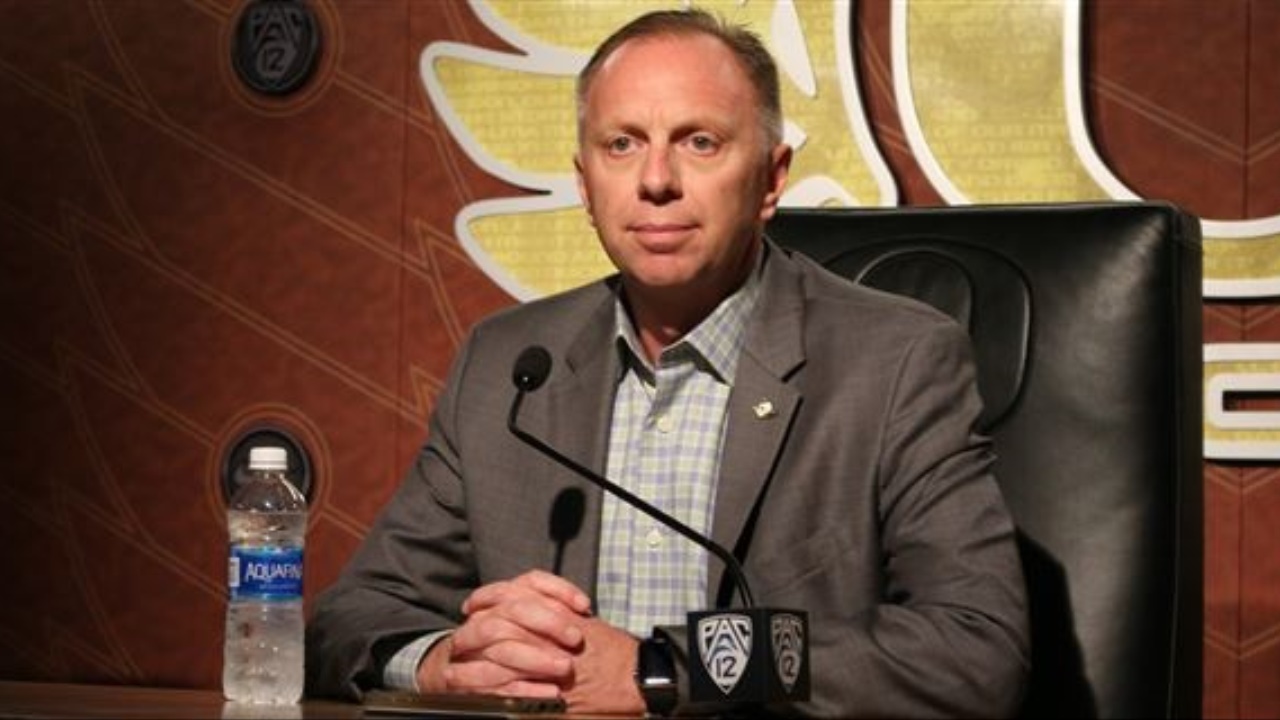
ROB MULLENS: Good afternoon, everyone. The committee spent Friday night and all day Saturday watching the conference championship games together. At 11:00 last night, the committee met to rank the 25 teams in college football. As you know, the committee ranked Alabama No. 1, Clemson No. 2, Notre Dame No. 3 and Oklahoma No. 4.
Let me take you inside the room. There was little debate about Alabama, Clemson and Notre Dame. There was a lot of debate about Oklahoma, Georgia and Ohio State. The debate was deep, detailed, and occasionally contentious. There was division.
I can report to you that different people in the room made a case for a variety of different outcomes. I don't think we left any combination off the field.
Some committee members believed Georgia should be No. 4, some believed Ohio State should be No. 4. Some believed Ohio State should be No. 5. Boy, did we debate it. As we considered three teams for the No. 4 slot, the committee did not believe that any one team was unequivocally better than the next. That meant we went to our protocol.
The protocol are guidelines given to the committee by the commissioners when they created the playoff. It's our rules of the road. It includes a variety of factors that we use to judge teams. No one factor is more important than another, and this year, the difference among 4, 5 and 6 was very close.
Oklahoma was ranked No. 4 because they're a one-loss conference champion with a dynamic offense, and their one loss was a close game to a ranked team at a neutral site. Georgia was ranked No. 5 because of their wins against highly ranked teams, their impressive performance against Alabama in the conference championship game, and because of how balanced a team they are.
Ohio State was ranked No. 6 because they're a one-loss conference champion with a big win over Michigan. The committee ranked them behind Georgia because the committee thinks highly of Georgia's body of work. We also think highly of Ohio State's body of work, but at times they have been inconsistent. We noted their only loss was to an unranked team.
The committee also determined the pairings for the Peach and Fiesta Bowls. The pairings are based on what we view as the best match-up for our highest ranked teams, while also taking into account a desire to avoid repeat appearances by the same teams at the same bowls.
The Peach Bowl on No. 29th will feature No. 7 Michigan against No. 10 Florida. On New Year's Day we will have three bowl games. The Fiesta Bowl will feature No. 8 UCF and No. 11 LSU. The Rose Bowl Game will be between No. 9 Washington and No. 6 Ohio State, and the Sugar Bowl will include No. 15 Texas against No. 5 Georgia.
It's an honor for me to be the chairman of this group. I've been around a lot of people in college football, and I've got to say, this group is special. Committee members prepare hard. They work hard, and they take their jobs seriously. They're here because they love this game and want to give something back. I'm grateful to every one of them.
Herb Deromedi, Jeff Bower and Bobby Johnson are our most recent graduates, and I want to particularly thank them for their efforts. It's been an honor working alongside of them. Thank you to all of you, as well, for your dedication and interest in our game. I'm happy to take your questions.
Q. Given that conference championships are a stated criterion, is there any consideration to the idea of once again having two teams from the same conference and freezing out a conference champion from elsewhere?
ROB MULLENS: Our task is simple: Rank the best teams, and as you talked specifically about the semifinals, it's to rank the four best teams, and that's what we go about doing. We don't discuss conference. Conference affiliation is not a part of it. It is simply about ranking the four best teams.
Q. You mentioned that there was little debate between Alabama, Clemson and Notre Dame and a lot of debate between 4, 5 and 6. Why was that as it relates to Notre Dame, especially given the fact that the teams behind it had played in a conference championship game?
ROB MULLENS: Well, I mean, Notre Dame was part of that discussion for a small piece, but there was rigorous debate around 4, 5 and 6. When you look at the protocol, and obviously we put Notre Dame on the board, 12-0, impressive resume, wins against a ranked Michigan, Northwestern and Syracuse, the committee felt they deserved the No. 3 slot. And then we went about really finding who that fourth team was going to be.
Q. (No microphone.)
ROB MULLENS: Sure. You know, this is my third year on the committee. We make sure we want to get this right, so there's a lot of debates. I would say -- maybe it's just because of recency, but it was as intense as any that I can recall. We were in the room roughly 11:00 last night. We didn't leave the room until 1:30. We were back at it early this morning. A significant portion of last night's was about those four teams, and again, there was a difference of opinion. So there was -- each combination was represented, and we vetted it very thoroughly.
Decided to sleep on it, very little sleep on it, come back in the morning, and we reengaged in some of the same debate after people had a chance to reflect and think. But again, the first order of business was to determine if we thought one of those teams was unequivocally better, and there were some in the room who thought that one or others were unequivocally better. But at the end of the day, the committee voted that they weren't unequivocally better, therefore we went to the protocol.
Q. What do you say to the players of UCF who finished unbeaten again, have won 25 straight and aren't getting a sniff of the playoffs?
ROB MULLENS: I'd say congratulations on a great season, congratulations on a conference championship. Impressive second half against Memphis. Obviously we spent some time talking about UCF. Again, another great year, a great opportunity to play an LSU team in the Fiesta Bowl, but in the committee's eyes, the strength of schedule just didn't hold up when you look at that peer group of 7 and 8.
Q. A conference championship mattered enough to Oklahoma to rank them ahead of Georgia, but it didn't matter enough to Ohio State to rank them ahead of Georgia, so can you try and provide a little bit more clarity as to just what is the value of a conference championship game in this system?
ROB MULLENS: Well, again, once we determined that -- as we were talking about those three teams being Oklahoma, Georgia and Ohio State, once we determined no one was unequivocally better, we go to the protocol, and the protocol has several factors, and conference championship is one of them. It's very important. When you look at the history of the playoffs, look at the number of conference champions that are in the playoff. It's a large percentage, so it carries plenty of weight. But there's other factors, strength of schedule, et cetera, and as we went on in this debate, that conference championship was a key piece for Oklahoma, and it did make a bit of a difference, but those teams were so tightly together, in the end the committee thought that that put Oklahoma at 4, Georgia at 5, given their strength of schedule with only a loss to a No. 1 team and I think ultimately our No. 11 team. Their body of work was pretty strong. And then Ohio State's inconsistencies, as I mentioned in my opening statement, put them at 6.
Q. When you have Frank Beamer and Joe Castiglione who both have to recuse themselves for Oklahoma discussions, during a contentious debate between three teams, are they in the room for that, or when Oklahoma is mentioned, they leave?
ROB MULLENS: Anytime Oklahoma is on the board, and even in this last weekend, we extend those recusals; if we're even talking about somebody they could be matched up against, they're recused. For all of this debate that I'm talking about, those two, plus Gene Smith, were recused from the room.
Q. What would you say to a conference commissioner who seeks your advice on whether he should have a nine-game conference season or an eight-game conference season based on your experience with the selection process, because it doesn't appear that only playing eight conference games has in any way hurt those conferences.
ROB MULLENS: Yeah, that's a local decision. I'm sure that there's a lot of factors that go into that. I really wouldn't -- again, that's a local decision. Strength of schedule is one piece of it. I think they can look at the history and glean what they want from that.
Q. You mentioned the conference championship, obviously, but you're looking at Oklahoma's resume, just a three-point loss to Texas, which they had a chance to avenge in the title game. On the other hand, you had the 29-point Ohio State loss, the 20-point Georgia loss to LSU. How big of a factor was that in the debate? Did that come up, and how does the committee look at that?
ROB MULLENS: Sure, we're looking at full resumes, so when you're doing the kind of debate that we're doing and the importance of that debate for that No. 4 piece, we're looking at every single game, and so of course when there aren't very many losses on the board, we're looking at the wins, we're looking at the losses. A three-point loss to a ranked team on a neutral field is different than the only loss amongst that peer group to an unranked team, and obviously we did take note that Georgia's two losses were against the No. 1 team in our rankings and what ultimately ended up being the No. 11 team. Sure, that was part of the discussion, but it was just one part of it.
Q. I was just wondering, on TV you said there was no clear-cut team that was up and above the best team on the start between Ohio State, Georgia and Oklahoma, and you said you reverted back to the criteria and the protocol. When discussing those three teams, what in the criteria and the protocol supported Georgia being ranked ahead of Ohio State?
ROB MULLENS: Again, we were looking at all four things. In that one, their strength of schedule was incredible. They have two losses, but to the No. 1 team in the country and to the No. 11 team. Again, it was very close, and a lengthy debate about all three of those teams. And again, we're looking at full resumes. Georgia had a number of games against ranked teams. Ohio State had impressive wins, as well. They probably had the most impressive win of the group with the win over Michigan. But again, they did have the only loss to an unranked team amongst that group.
Q. As one of the committee members, do you feel that the protocol helps you determine the top four teams? Does it give you what you need and put you in the best position to make those decisions, or would you rather see conference championship games or something be weighted to help guide you a little bit more?
ROB MULLENS: I think the commissioners did an outstanding job when they thought about setting this up, and they were very thorough, because again, this is an art, not a science. I think the protocol gives very clear guidance, and that guidance, when you determine that teams are not unequivocally better, is very helpful. It certainly was very helpful today and last night in my opinion.
Q. There was a lot of debate over picking the four best teams versus the four deserving, as in four best, you should pick Georgia because they're clearly this good, et cetera, et cetera. Is there confusion over whether the charge is to pick the four best versus the four best resumes?
ROB MULLENS: Our charge is very clear: To pick the four best teams. Before we start every meeting, every time we gather in Grapevine, Texas, we do review a piece of the protocol. We're very clear on the charge, to get the four best teams. Obviously reasonable minds can disagree on what that looks like, and that's why we have a protocol to make sure that we lean on when we have to make tough decisions.
Q. Oklahoma's defense has been the thing, obviously, holding them back, I think, the most this season. How much when you're debating a contentious between three teams does the fact that they have played better the last couple weeks, how much did that weigh in to helping them elevate into the fourth spot?
ROB MULLENS: It's certainly part of the conversation. Again, we watch all the games. We're looking at every single result, and the fact that their defense had two touchdowns in their last game and then had a key play in their last regular-season game and then had a key play yesterday, sure, that's a piece of it, no doubt. But we're also looking at the results of all the other teams that they're up against, as well.
Q. I understand y'all were up here until 1:30 in the morning or so last night; when did you finally settle on the four teams? Was it last night before you broke, or today did that conversation go close to when y'all had to have it figured out?
ROB MULLENS: Yeah, it went -- I think it probably went up until 10:30-ish this morning. So we went until 1:30, debating, discussing, decided that it was 1:30, and we had been going at it pretty good and wanted to take some time away, reflect and come back, and we started the debate up early again this morning.
Q. A couple times during the last couple weeks, you've referred to Oklahoma as having a historic offense, and for a long time in football, the feeling was the defense wins championships. Has the thinking evolved even since you've been on the committee in how you evaluate teams with really, really big-time offenses there versus maybe the old-school thinking of five, 10, 15 years ago?
ROB MULLENS: Again, I think that's the beauty of this setup, right? You have 13 diverse backgrounds with a different set of experiences and a different set of opinions. And when you can get those 13 passionate experts in a room with a system that supports rigorous, candid debate, you get the best results.
So sure, that's part of the debate is how do you evaluate a team that has a historic offense and maybe a defense that doesn't match that? And so there's a lot of different ways to win football games. Our charge is to find the four best teams and debate why -- who that is and why we think it's that way.
Q. As the conversation surrounded Georgia and there was support for that team within the room, was there anybody who voiced concern about just putting a two-loss team in that didn't win its conference championship and about what kind of a reaction that would get?
ROB MULLENS: No, I mean, our job is to pick the four best teams. So it really wasn't about number of losses. Obviously when you're looking at the resume, you can see that they've got two and others have one, but again, their two losses are against highly ranked teams. It's really about trying to get the four best teams. The conference piece is out of it. That's really not a part of it. We're looking at -- there were some people who felt they were the fourth best team, and even some that felt they were unequivocally felt they were the fourth best team. But after all the dialogue, the debate, the intensity, you put it to a vote, and the vote didn't have them as unequivocally the fourth best team. In fact, it had them ranked No. 5.
Q. Back to the UCF discussion, what's it going to take in your opinion for a Group of Five team to break into this?
ROB MULLENS: You know, I'm not going to project on that. Again, I think the protocol is pretty clear. When you look at how we're supposed to evaluate picking the four best teams, conference championship is one of them, strength of schedule is one of them, results against common opponents is one of them. Again, I would just point to the protocol. I think it's laid out pretty clear.
Q. Florida at 10, Kentucky at 14, same record, but Kentucky had beaten Florida head-to-head. What did you see as the gap between those two?
ROB MULLENS: Yeah, as you get late into the year, it gets difficult. There's a lot of -- sometimes you have a lot of conflicting info. I think it was just Florida's total body of work. While they lost the head-to-head, their total body of work with some impressive wins. I know Kentucky had some impressive wins, as well, but I think it was just total body of work.
